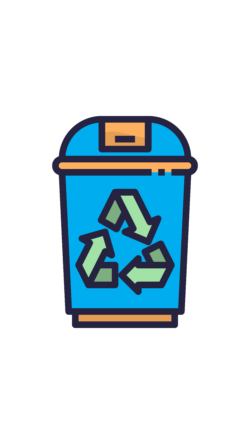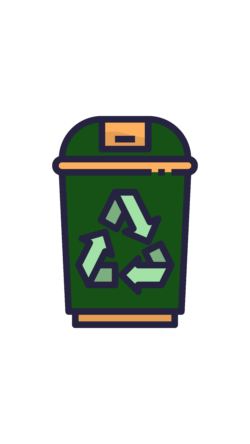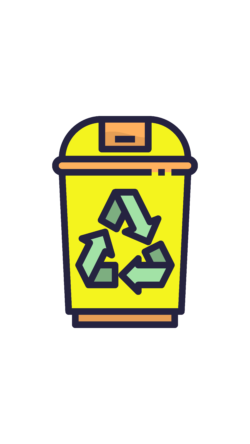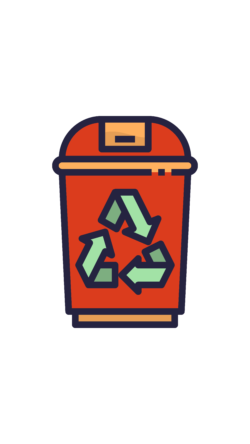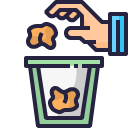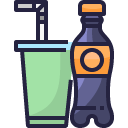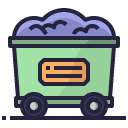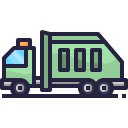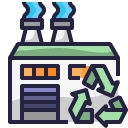Sustainability
Composting trial.
The team at UNE Life and Armidale Waste Management Facility has run tests to see how fast the breakdown of BioPak packaging takes!
The teams are over the moon with this breakdown and it falls under Armidale's composting guidelines.
These images are after 8 weeks in a compostable situation. All the BioPak packaging broke down - the plastic straws, salad pots, and sandwich windows had completely broken down.
UNE Life will continue to use the most sustainable, environmentally friendly packaging on the market.
Get all the FAQ's
What does sustainability mean?
sustainability
-
avoidance of the depletion of natural resources in order to maintain an ecological balance.“the pursuit of global environmental sustainability”
Commercially compostable VS compostable at home
Commercially compostable
Commercial compost means compost created at a facility where the perfect balance of temperature, moisture, particle size, oxygen flow, and nutrient balance. This then breaks down organic and plant-based materials and they turn into compost.
Items a commercial compost can handle include;
- Food waste inc. meat, fish, fruit, vegetables, leftovers
- Napkins, tissues & paper towel
- Cardboard takeaway containers (BioPak)
- Coffee cups & lids (BioPak)
- Salad pots & lids (BioPak)
- Sandwich boxes (BioPak)
- Pizza boxes
- Disposable Napkins
Compostable at home
It’s a little harder to create the perfect balance of heat, moisture, and oxygen at home for your everyday compost – which means it’s not likely that you can break down bigger the items at home in your compost.
Items your home compost can handle include;
- Food waste inc. meat, fish, fruit, vegetables, leftovers
What's the difference between Biodegradable and Compostable?
Biodegradable
This refers to the ability of materials to break down and return to nature.
Biodegradable products must completely break down and decompose into natural elements within a short time after disposal – typically a year or less.
This helps to reduce the buildup of waste, contributing to a safer, cleaner, and healthier environment.
Materials that are biodegradable include:
- corrugated cardboard
- some plastics (like the BioPak containers UNE Life uses for salads, sandwiches, coffees even the straws)
Compostable
These materials are very similar to biodegradable materials, as they are both intended to return to the earth safely.
However, compostable materials go one step further because they give the earth nutrients once the material has completely broken down.
Compostable materials (UNE Life food and coffee packaging) can be added to compost piles, which are designated sites with specific conditions dependent on wind, sunlight, drainage, and other factors.
Compostable materials require special composting conditions, Armidale Regional Council’s City to Soil Facility ensures these conditions are met.
Compostable packaging materials include;
- BioPak packaging (coffee cups, straws, sandwich boxes, salad pots, etc.)
- starch-based packing (alternative to Styrofoam)
What can I put in the Red Bin?
The Red Bins are for items that cannot be recycled or composted i.e. General Rubbish.
- No food waste
- No glass
- No metal
When in doubt please use this bin to avoid contaminating the recycling!
What can I put in the Yellow Bin?
The Yellow Bins are for Plastic Food Containers (free from food residue).
- Plastic bottles
- Glass bottles
- Drink cans
What can I put in the Green Bin?
The Green Bins are for Compostable Items.
- Food waste
- Napkins & tissues
- Cardboard takeaway containers (BioPak)
- Coffee cups & lids (BioPak)
- Salad pots & lids (BioPak)
- Sandwich boxes (BioPak)
- Pizza boxes, scraps and all
UNE Life outlets use BioPak as its packaging – this is all compostable!
Please note; if you have brought rubbish from another food outlet – it might not be compostable, check out the packaging labelling, and put it in the correct bin. If you’re unsure, put it in the red bin!
Why are there so many different bins?
At UNE we have developed a four-bin system – RED, YELLOW, BLUE, and GREEN, this is to help you help us manage our waste more sustainably.
This means our Waste Collection Company and the Waste Transfer Station don’t have to deal with contaminated waste and ensure we’re looking after the planet a little more.
Which bin do paper and cardboard go in?
The Blue bins!
These bins are for clean paper and cardboard.
Blue bins are located within all academic buildings, typically in the print rooms and there are cardboard cages for cardboard located throughout the campus.
Armidale Recycling Services process the following recyclables from the residential kerbside and business collections:
Paper and cardboard is processed and baled into one-tonne blocks and transported to paper mills within Australia.
UNE engages Ascent to collect our paper and cardboard. Ascent is a prominent community-based Disability Service Provider located in Armidale who specialise in providing individual, ethical and effective support for people with disabilities, their families, and carers. Ascent then delivers this material to the recycling center. It costs more but it is supporting our local community.
What happens to my recycling once it leaves the campus?
Paper and cardboard are collected by Ascent, a local not for profit organisation where it is sorted and baled. The material is sent to a larger processing facility where it is recycled into new products – typically cardboard packaging like cereal boxes.
Glass, plastics, aluminium cans are taken to the Armidale Recycling Services material recovery facility.
The material is loaded onto a conveyor belt and staff manually sort the waste into the various streams. Armidale Recycling Services produces one of the highest quality recyclables because of source separation – i.e. keeping cardboard and paper separate from plastics and bottles that may have a small amount of liquid residue.
Once sorted, processed, and baled they are ready to be sent to market for recycling.
These markets are located within Australia and some overseas depending on the demand and quality of the different types of products.
The key factor in enabling Armidale Recycling Services to keep these markets is to have source separation and low contamination rates at the kerbside/pickup.
Armidale Recycling Services currently recycling 97% of all recyclables collected and processed.
Are all coffee cups compostable?
No.
This is a tricky one. Many packaging companies venues and councils don’t follow the strict waste guidelines that we do.
You can rest assured that any coffee you purchase on campus will be in a compostable cup.
UNE Life works with BioPak who produces sustainable, environmentally friendly packaging.
BioPak champion compostable packaging (GREEN BIN worthy) and are focussed on reducing tree-based paper and fossil fuel-based plastic used in foodservice ware by offering an eco-friendly alternative.
Is packaging at UNE compostable?
Yes.
UNE Life has worked towards achieving 100% verifiable compostable packaging in all catering and prepared food packaging that is delivered on campus.
By working with BioPak to meet our individual needs, UNE Life can guarantee that foodservice packaging is sourced from one provider that is certifiably compostable and has extensive experience in assisting businesses, particularly universities to work with stakeholders and reduce contamination to minimal amounts, whilst promoting education on the subject.
What items are considered contaminants in recycling?
Contamination happens when non-recyclable items are mixed in with recyclables items or when recyclable items are placed in the wrong recycling bins.
Many items can be considered contaminants.
Paper or food packaging smeared with leftover food or grease cannot be processed with clean paper and can ruin a newly made product if it is not caught before it goes to the factory.
At UNE, this issue is solved by our compostable packaging and GREEN BINS. BioPak packaging and food can go into these bins.
Top tip: If you’re at home be cautious, a pizza box with smears of grease is contaminated so can’t be recycled. Put this in your green waste as it can be composted.
What should I do with slightly used paper towels and paper napkins?
Although these items are paper, these items are not recyclable because they are considered contaminated.
You can place paper towels and napkins in the GREEN BINS bin on campus.
Who is responsible for recycling on campus?
EVERYONE is responsible for recycling on campus. It just takes one or two people misusing the bins to contaminate all of the other materials.
FMS coordinate the operational aspects of waste from the cleaners emptying the bins to the bins being collected by the waste and recycling contractors
What should I do if I notice contaminated recycling?
If you notice contaminated recycling or a bin that looks like it needs emptying simply Alert FMS and they will ensure this is seen to.
FMS empties and checks on the bins regularly.
How can I reduce my recycling waste?
There’s many ways and over the next few months we will be working with UNE Life to produce a few blogs to help answer these questions.
Here are a few ideas;
- Limit your use of single-use and disposable products and choose alternatives that can be used again.
- Choose products with minimal or no packaging where possible.
- Keep reusable bags handy so you remember to take them to the shops;
- Put a “no junk mail” sign on your letterbox.
- Give unwanted clothes, household items, furniture, or appliances to family or friends, or donate them to charities. Freecycle and other online groups help communities give away unwanted items.
- If purchasing something, try to find it second-hand or buy items containing recycled content.
- Use glass jars to store food or other items
- Avoid single-use items/foods
- Get your own reusable bottle
- Use reusable cutlery and storage containers
- Take a reusable travel mug with you to work
- Cancel your magazine and newspaper subscriptions and read them online or at the library
- Avoid disposable coffee pods or capsules
- Set your printer to default print on both sides.
Which plastics are recyclable?
Most plastics are not biodegradable – this means they cannot break down easily after disposal and can remain on the planet as waste for a very, very long time.
UNE Life uses BioPack for their food packaging – this plastic is biodegradable and can go in the GREEN BIN.
Other plastics like drink bottles can go into the YELLOW BIN.
If you’re unsure – place it in the RED BIN.
Can we recycle for cash?
Yes. There are Return and Earn facilities located in Armidale – one in the Woolworths car park and one at the Armidale Waste Management Facility.
What can’t be recycled?
- Cigarette butts
- Waxed paper wrappers
- Styrofoam
- Batteries (there are separate battery recycling locations around the campus – one in each college and in Dixon Library)
- Soft plastics like cling wrap
- Ceramics and Pottery
- Nappies
Is recycling different in different areas?
Yes. Depending on your council, these rules will be different.
You should always look to your local council for guidance.
Recycling in Armidale
Armidale has an outstanding waste management record. With recently upgraded recycling facilities and a high level of community participation, our recycling figures are exceptional. The Armidale region recycles approx 60% of its waste each year.
For more information on the benefits of recycling visit Planet Ark.
What can I do with my old batteries?
Recycling stations for small batteries (such as AA, AAA, mobile phone batteries) are located at the front desk of Dixon Library, and at the reception area of each college.
Toner Cartridge Recycling
Toner cartridges bins are provided in conjunction with Planet Ark and are located in printer rooms throughout campus. They can be used to recycle the following items;
- Inkjet cartridges
- Laser cartridges
- Toner bottles
- Fuser and drum units
- Print heads
Once the bin is full simply tie off the bag and send it out with the internal mail. FMS is in the process of organising the placement and collection of the bags through Planet Ark for disposal.
UNE Landcare
Landcare is a community-based network committed to the sustainable management and use of natural resources.


